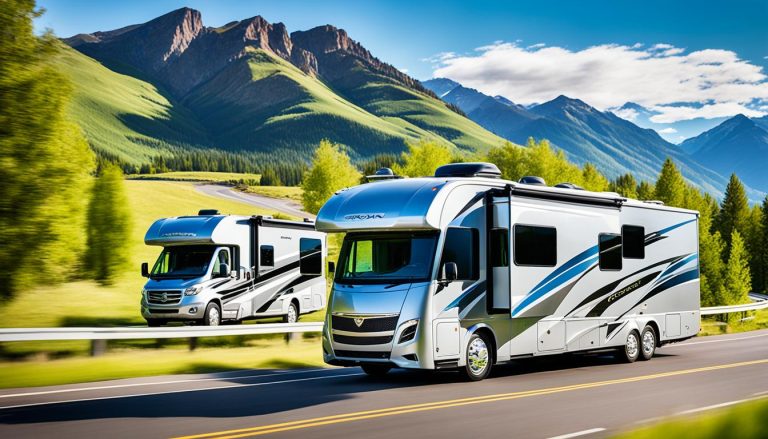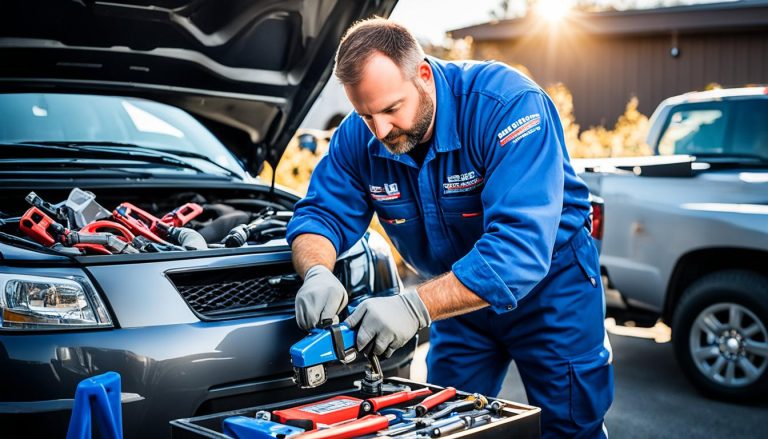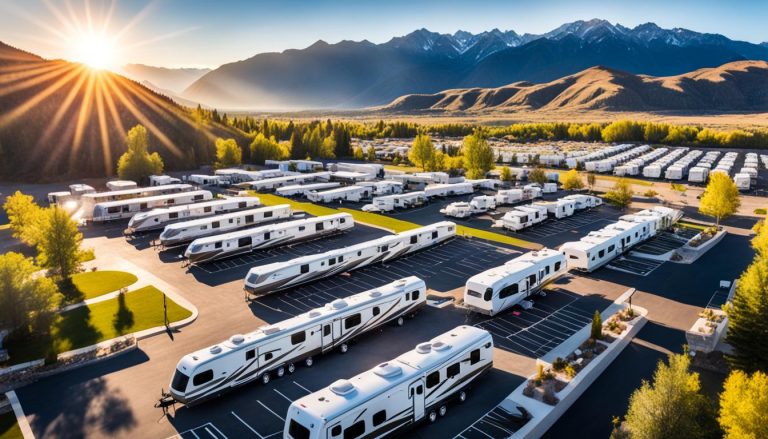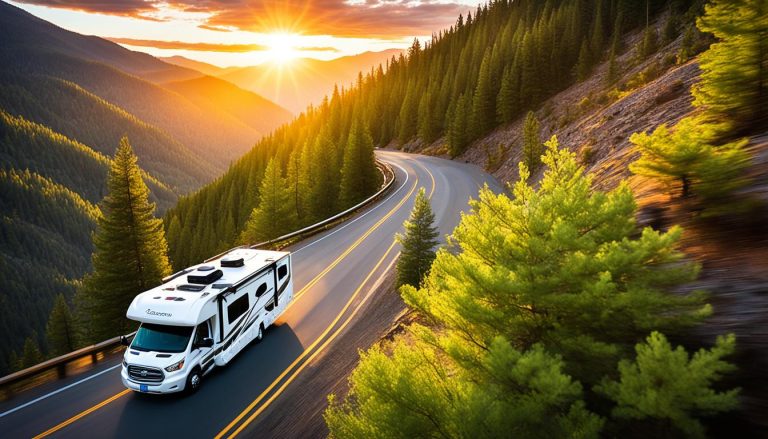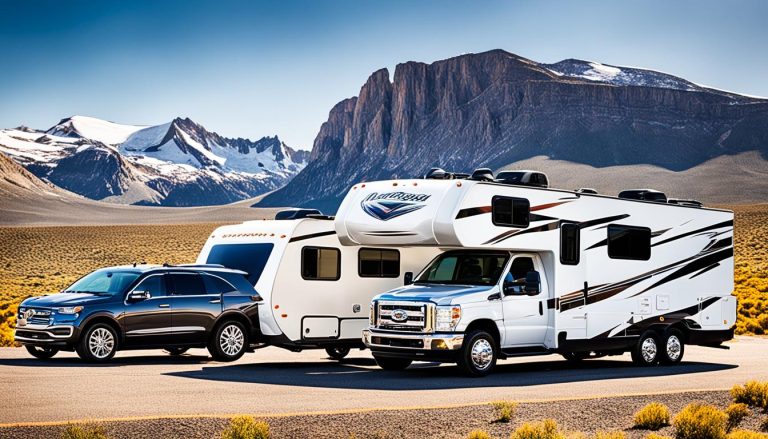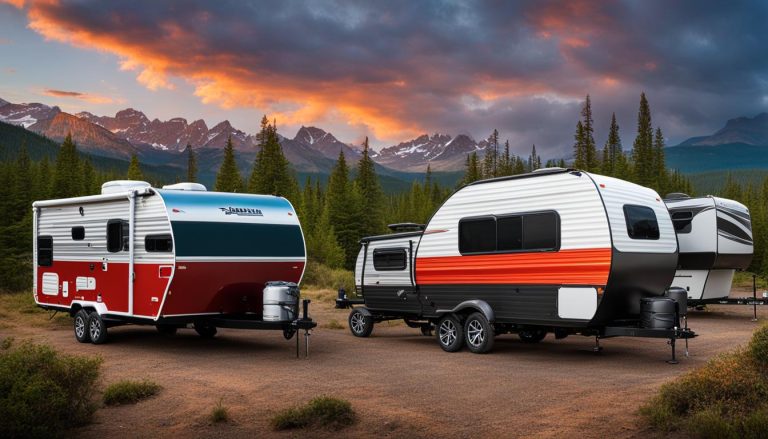Find Your Perfect RV: Budget & Feature Guide
gorvlifestyle.com and its partners may earn a commission if you purchase a product through one of our links
Finding the ideal recreational vehicle (RV) that suits both your adventurous spirit and your wallet can be a thrilling yet daunting task. With the vast expanse of options out there, it’s essential to navigate the market with a clear idea of your RV budget selection and the RV features selection. Whether you’re aiming to traverse the scenic byways of the American landscape or seek solace in remote campgrounds, choosing the right RV based on budget and desired features is key to unlocking a world of freedom and leisure.
Those new to the RV scene and seasoned travelers alike converge on locales such as the bustling RV expos in Denver, CO, seeking that perfect home-on-wheels. Here, one detects the common thread binding all attendees: the search for an RV that aligns with personal travel aspirations while adhering to financial prudence. Let’s embark on this journey together and lay down the groundwork for your future expeditions in comfort without compromising the purse strings.
Key Takeaways
- Assessing your needs and aligning them with your budget is the first step in the RV selection process.
- Understand the importance of distinguishing between essential features and those that are just nice-to-have.
- Stay informed on various RV types to ensure your choice is a balance of comfort and cost.
- Consider the broader implications of RV ownership, including maintenance, operational costs, and lifestyle changes.
- Embrace the art of trade-offs to find a vehicle that provides a seamless travel experience without financial overreach.
- Join the community of RV enthusiasts for shared experience insights, which can be invaluable in making your decision.
Understanding the RV Buying Process
Navigating the myriad of choices in the world of recreational vehicles requires a blend of self-awareness and practicality. Embarking on the journey to purchase an RV begins with understanding the expansive landscape of options available, and tempering the hunt for the elusive ‘perfect RV’ with a strategy grounded in reality. This is where invaluable RV budgeting tips and a thoughtful RV features comparison come into play.
Recognizing the Overwhelming Choices in RV Selection
When faced with the diverse marketplace of RVs, buyers are often awestruck by the range of types, sizes, and features. Determining which vehicle will suit one’s lifestyle involves sifting through a plethora of details—from the basic travel trailer to the luxurious motorhome. Every RV type offers a unique set of advantages, and understanding these nuances is fundamental in refining one’s choices to find an ideal match for both budget and comfort.
The Myth of the Perfect RV and Adjusting Expectations
The quest for the quintessential RV is frequently mired by the misconception that such a vehicle exists. In truth, the ‘perfect’ RV is subjective, shaped by individual travel needs and financial limitations. Aspirant RV owners should glean insights from the experiences of seasoned travelers, acknowledging the necessity for compromises. Identifying and prioritizing critical features over desirable extras facilitates a more targeted, and ultimately satisfying, purchase.
- Consider space necessities versus luxury amenities.
- Factor in the frequency and type of anticipated travels.
- Balancing cost with features—acknowledging that sometimes less is more.
By adopting this informed approach, buyers can seamlessly traverse the complexities of RV selection, ensuring that their investment brings them a step closer to crafting their unique version of the open road dream.
Choosing the right RV based on budget and desired features
Finding the best RV for your budget starts with a candid assessment of what you can comfortably afford. While the allure of spacious living quarters and high-tech gadgets is undeniable, giving priority to your financial well-being will enhance your overall RVing experience. By juxtaposing affordability with the essential comforts of home, you can secure an RV that promises adventure without fiscal anxiety.
Setting a Realistic RV Budget
Embarking on the journey to purchase an RV is an exhilarating feat, yet requires a foundation of financial prudence. Prospective buyers are encouraged to delve into their finances and designate a spending limit that accounts for not just the RV’s price tag, but also the inevitable additional investments such as towing gear and maintenance. Constructing a budgetary framework that envelopes these costs is crucial to making an affordable RV choice that aligns with your lifestyle.
Assessing the Must-Have Features versus Nice-to-Haves
Once your budget is established, the next pivotal step is to distinguish between the non-negotiable features that an RV must possess and those that, while appealing, aren’t essential. Creating a clear divide between these categories can prevent overextension of your finances and ensure you’re investing in amenities that will substantially affect your comfort and enjoyment on the road. The quest for affordable RV options doesn’t mean compromising quality; it’s about aligning your financial capacity with a pragmatic yet delightful RVing experience.
- Kitchen essentials vs. luxury appliances
- Basic bathroom facilities vs. deluxe setups
- Enough sleeping space for all travelers vs. extra guest accommodations
- Functional living area vs. expansive slide-outs
Coupling fiscal responsibility with a strategic approach to feature selection is the cornerstone of finding an RV that promises freedom and happiness on your travels while staying firmly grounded in budgetary reality.
Defining Your RV Lifestyle and Usage
When considering an RV lifestyle choice, prospective owners must delve into the nuances of what it means to live on the road. Will the RV become a full-time residence? Perhaps the allure of the open road is only for weekend escapades. Assessing one’s intended RV use can sharpen the focus when selecting the perfect home on wheels. Full-time RV living conveniences have made it possible for many individuals to fully embrace a nomadic lifestyle, turning scenic byways into their front porch.
Full-timing Versus Occasional Travel
The decision between a full-time RV lifestyle and occasional travel can be complex. Those opting for full-time RV living often prioritize features that make a mobile life comfortable and sustainable, such as enhanced storage, residential-style kitchen amenities, and all-seasons insulation. On the other hand, weekend warriors might focus on compact, easy-to-store units that offer a break from the everyday without a heavy emphasis on the complexities of constant travel.
Identifying Travel Styles and Hobbies
Every RV enthusiast has unique travel styles and hobbies that influence their overall RV experience. Off-grid adventurers seek robust systems like solar power and water purification, while those leaning towards park-centric travel might value connectivity features and entertainment setups. The type of activities, whether they be hiking, kayaking, or photography, also play a vital role in shaping the layout and storage solutions of their RV.
| Travel Style | Full-time RV Features | Occasional Travel RV Features |
|---|---|---|
| Off-grid Exploration | Solar power setups, larger water tanks, rugged construction | Portable generators, adaptable gear storage |
| Park-centric Stays | Enhanced Wi-Fi capabilities, slide-outs for extra space | Compact design, simple setup and breakdown |
| Active Hobbies | Dedicated storage for gear, durable interior finishes | Flexible interior for occasional gear transport |
| Social Entertaining | Open floor plans, outdoor kitchens/screen rooms | Awning and external sound systems |
The journey of choosing an RV is singular to each person’s lifestyle, frequency of travel, and favored pastimes. By taking into account these factors, the pursuit of the perfect RV becomes a personalized adventure in itself.
Decoding RV Classes and Their Impact on Your Budget
As you navigate the landscape of recreational vehicles, understanding the differences between RV classes options becomes crucial to grasp their influence on pricing and features. The journey to finding the right RV for you begins with a clear RV pricing guide that considers these classifications. Let’s delve into the details of motorized RVs and towable units, each offering unique advantages and cost considerations.
| RV Class | Description | Price Range | Primary Advantages |
|---|---|---|---|
| Class A Motorhomes | Luxurious and spacious, often akin to a home on wheels | $60,000 – $500,000+ | Full range of amenities, comfort for long trips, ample storage |
| Class B Motorhomes | Compact, van-like and ideal for solo travelers or couples | $40,000 – $150,000 | Ease of driving, better fuel efficiency, suitable for stealth camping |
| Class C Motorhomes | A mid-size option that blends size and amenities | $50,000 – $200,000 | More sleeping space, better maneuverability than Class A |
| Travel Trailers | Towable units with a range of sizes and features | $10,000 – $100,000 | Flexible for different towing vehicles, variety of layouts |
| Fifth-Wheels | Larger towables with a gooseneck connector | $20,000 – $150,000 | Spacious living quarters, stability in towing |
| Toy Haulers | Feature a garage space for motorcycles, ATVs, or bicycles | $20,000 – $150,000 | Utility space for gear, adaptable for office or additional sleeping area |
When examining motorized units, remember that their convenient all-in-one design simplifies the setup process upon arrival at your destination. In contrast, towables require an appropriate towing vehicle but often present fewer upfront costs, giving them an edge in the budget-friendly department. Ultimately, whether you’re aspiring for an on-the-go luxury lifestyle or a modest means to explore the outdoors, aligning RV classes options with your unique travel needs and budget is paramount.
Analyzing RV Features for Comfort and Utility
When embarking on the journey to find the perfect RV, aficionados often prioritize the features that will provide not just convenience, but also a sanctuary of comfort. This shift towards a comprehensive RV feature utility assessment is instrumental in ensuring that time spent on the road is as cozy as it is functional. With trends leaning towards a more comfortable RV interior design, let us delve into how we can align these features with the living needs of the modern traveler.
Evaluating Floor Plans for Living Needs
Choosing the right floor plan is about more than just the number of beds; it’s about crafting an environment that serves as a versatile foundation for daily life. Diving into a detailed comparison of floor plan configurations, we find that the layout can significantly impact the practicality and enjoyment of the RV lifestyle.
| Feature | Description | Utility Benefit |
|---|---|---|
| Expandable Sections (Slide-Outs) | Areas that expand outward to increase living space when stationary. | Enhanced living and storage space while maintaining a compact design for travel. |
| Convertible Furniture | Furniture that converts to serve multiple purposes, such as dinettes to beds. | Increases functionality of spaces without compromising on available amenities. |
| Centralized Control Panels | Unified systems to control lighting, heating, and other features. | Streamlines operations for convenience and ease of living. |
The Benefits of Quality, Comfort, and Accessibility
The pursuit of a serene and functional living space on wheels means paying attention to the often overlooked facets of RV design. Renowned manufacturers heed the call for a balance between elegance and accessibility in their interior offerings. From the resilience of materials chosen to the ergonomics of the space, every detail contributes to the overall experience.
- High-quality Build: Robust construction materials that withstand travel strains and offer longevity.
- Intuitive Layout: Strategic placement of amenities for easy access and movement throughout the interior.
- Optimal Storage: Innovative storage solutions that facilitate organization and reduce clutter.
The merging of these aspects with thoughtful design marks the advent into a new era of RV travels—one where each journey is encapsulated with the comfort of home and the thrill of the open road.
RV Ownership Costs: Beyond the Price Tag
Exploring the RV ownership realistic cost involves understanding both one-time expenses and ongoing financial commitments. Newcomers to the RV lifestyle might initially focus on the sticker price, but savvy owners quickly realize that RV maintenance expenses play a significant role in the total cost of ownership.
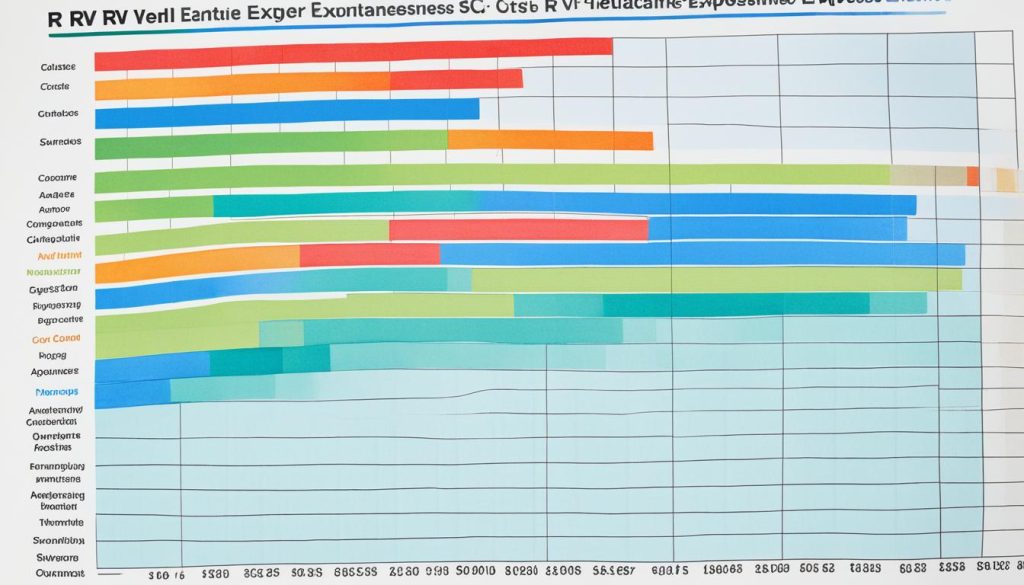
Calculating Upfront and Recurring Expenses
When bringing home a new RV, immediate outlays extend past the vehicle itself. Essential startup gear such as hoses for water and sanitation, leveling blocks, and perhaps additional towing equipment if you’ve opted for a towable model, are just the beginning. As you venture out, recurring costs such as campsite fees, utilities, and fuel fluctuations will become routine. These expenses can quickly add up, shaping a more comprehensive picture of what it really costs to own and operate an RV.
Membership Considerations for Cost Savings
Membership clubs within the RV community serve as a buffer to lessen the blow of ongoing expenses. With an array of organizations providing discounts on campsites, fuel, and even maintenance, the savvy RV owner often leverages these affiliations to stretch their dollar. These memberships can be a boon for those keen to manage their RV maintenance expenses effectively and ensure their journey is as economical as it is enjoyable.
Exploring Towable vs. Motorized RVs
Choosing between a towable and a motorized RV is a crucial decision that can significantly shape your travel experiences and comfort. When considering RV towing considerations, it’s important to account for your primary vehicle’s capabilities and the type of adventures you envision. Meanwhile, the debate of towable vs motorized RV convenience boils down to personal preferences in mobility and setup efficiency.
Comparing Towing Capabilities and Convenience
For many, the choice of RV is influenced by the freedom to explore without the constraints of a larger, all-encompassing vehicle. Towable RVs present the flexibility to detach and use the towing vehicle independently, an advantage for day trips or excursions away from the campsite. However, this option requires careful consideration of towing limits and the need for compatible equipment.
The Ease of Setup and Breakdown for Various RV Classes
While motorized RVs streamline the transition from driving to living, offering the convenience of a uniform setup, many aspire to the simplicity that towable RVs offer. These units allow travelers to set a ‘basecamp’ and utilize their towing vehicle freely. The ease with which one can switch from transit mode to a comfortable living space often becomes a defining factor in the selection process.
| Towable RV Advantages | Motorized RV Advantages |
|---|---|
| Detachable from towing vehicle for exploring | Seamless transition between driving and living spaces |
| Diverse options fitting various towing capacities | No need for a separate towing vehicle |
| Typically offers more living space for the price | Easier to maneuver for those uncomfortable with towing |
| Often more affordable than motorized options | Better fuel efficiency compared to towing setups |
Whether settling for a towable RV that complements your existing vehicle or opting for the unified approach of a motorized RV, the decision hinges on a blend of practical towing considerations and the allure of travel convenience. The right choice accommodates not just the physical requirements but also the desired pace and style of your RV adventures.
Navigating RV Size and Space Requirements
Choosing an RV that fits your travel lifestyle is more nuanced than simply selecting the largest model available. When looking at appropriate RV sizing, potential owners should consider how each model aligns with their travel destinations, needs for comfort, and ease of transportation. For many, the key lies in maximizing RV space to ensure every journey is as comfortable as it is memorable.
Aligning RV Size with Your Travel Goals and Comfort
Selecting the right RV size is a delicate balance between comfort and practicality. While a larger RV might seem like the best option for those wanting spacious living quarters, it’s crucial to consider parking limitations at various campsites. Conversely, a compact RV offers greater flexibility but may have limitations on living space and storage. It’s essential for travelers to consider their comfort with maneuvering a larger vehicle and whether the RV will accommodate their adventure style, from serene park retreats to rugged off-road excursions.
Confronting the Myths of Bigger Being Better
It’s a common misconception that a bigger RV equates to a better experience. However, the idea of ‘the bigger, the better’ doesn’t always hold up against the practical realities of RV travel. Larger models may restrict access to remote or densely wooded campsites, whereas smaller RVs may enhance your access to the great outdoors. Thus, it’s imperative for RVers to reflect on their true needs and desires, striking the right balance between ample living space and the freedom to roam widely.
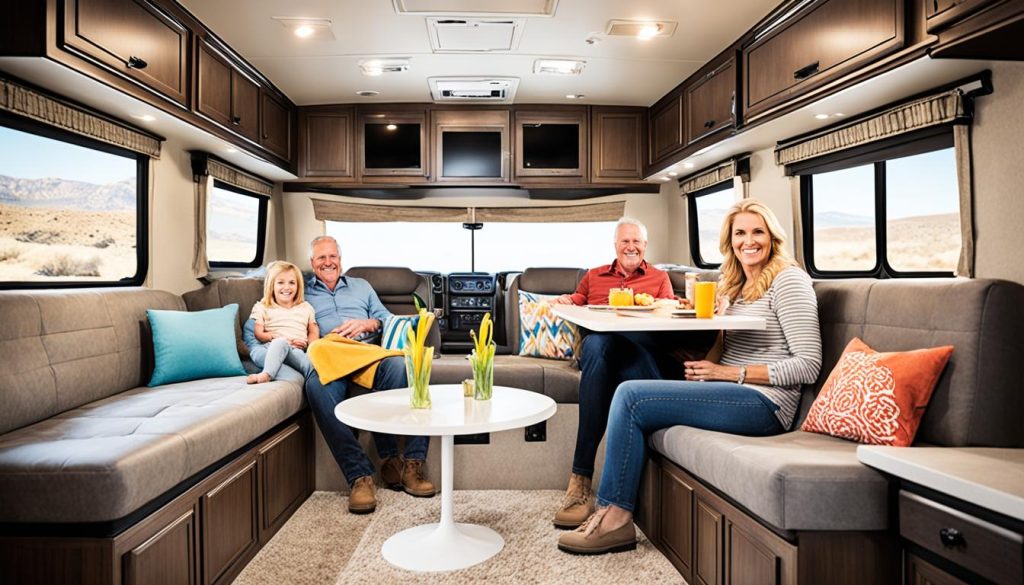
- Assessing Travel Frequencies: How often you travel and the duration of your stay can impact your decision on RV size.
- Destination Accessibility: Consider the types of places you aim to visit and whether they have size restrictions for RVs.
- Lifestyle Amenities: Determine which amenities are essential for your lifestyle and if they can be comfortably housed within a smaller footprint.
- Storage Solutions: Innovative storage solutions can often mitigate the concern of limited space, allowing for an organized and clutter-free environment.
In conclusion, when selecting an RV, size shouldn’t be the sole determining factor. Travelers must carefully consider their needs, prioritize their comfort, and dispel the myth that bigger is always better in order to make the most of their RV experience. By focusing on the right factors, you can find the perfect travel companion that offers both the space you need and the freedom you desire.
Getting the Best Deals: Shopping for Your RV
Embarking on the RV purchasing journey demands employing RV shopping best practices to ensure you uncover the most rewarding deals. In the quest for your dream RV, meticulous research paired with an astute comparison approach is key. Buyers must navigate the waters of pricing, features, and value to truly secure RV deals that resonate with their distinct needs and preferences.
Researching Dealers and Private Sellers
When it comes to purchasing an RV, the path to finding your ideal match begins with an in-depth look at both dealerships and private sellers. Dealers often provide a variety of options and professional guidance, while private sellers may offer unique finds and potentially lower prices. The critical element is to verify the credibility of the seller and ensure the RV’s condition is as advertised.
Utilizing Online Forums and RV Groups for Insider Advice
An invaluable resource for prospective RV owners is the collective wisdom found in online forums and RV communities. These groups serve as treasure troves of personalized experiences, tips, and sometimes even insider secrets that could lead to securing your ideal RV at an optimal price.
| Resources | Advantages | Considerations |
|---|---|---|
| Dealerships | Wide selection, professional assistance, warranty options | May have higher prices, sales pressure |
| Private Sellers | Potential for lower prices, unique finds | Requires thorough inspection, less recourse |
| Online Forums | Community advice, wide range of perspectives, insider tips | May require sorting through subjective advice |
| RV Shows | Ability to negotiate deals, variety of models to view | Can be overwhelming, impulse buying risk |
Personalizing Your RV
Making your RV feel like home is both an art and a science. With thoughtful RV customization, owners craft not merely a mode of transportation but a personalized retreat that travels with them. It’s about selecting colors, patterns, and textures that reflect one’s personal style, while also optimizing the limited space for comfort and utility.
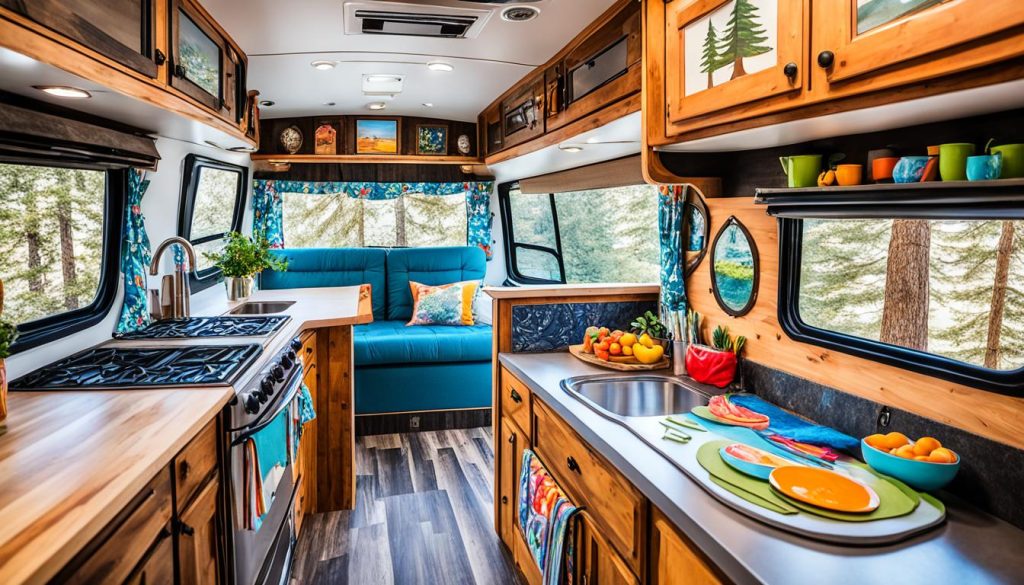
Several RV enthusiasts have shared transformative modifications that prove even the smallest changes can have a significant impact:
- Upgrading upholstery with fresh fabrics
- Installing customized storage solutions to reduce clutter
- Adding decorative elements such as curtains, throws, and cushions
- Incorporating smart technology for a more efficient living space
These modifications not only increase the comfort level but also enhance the overall experience of being on the road.
“Your RV should be an extension of your lifestyle. When you step inside, it should feel like a warm embrace, a place where all your cares melt away,” notes an avid RVer.
To further assist in implementing these changes, here’s a comparison of potential upgrades that have proven popular among RV communities:
| Customization Type | Functional Benefit | Personal Benefit |
|---|---|---|
| LED Lighting Upgrade | Energy efficiency and longevity | Custom ambiance setting |
| Custom Bedding | Improved sleep quality | Aesthetic appeal and comfort |
| Wall Decor (Art, Mirrors, etc.) | Increased sense of space | Display of personal taste |
| High-quality Sound System | Entertainment upgrades | Personalized soundtrack to travels |
Ultimately, making an RV feel like home encapsulates much more than interior design—it’s creating a space that’s uniquely yours, that welcomes you after a long day of adventure. Whether through a full remodel or simple modifications, the goal is to imbue your living space with a sense of “you,” turning every journey into a return home.
Planning for the Future with Your RV
Embarking on the RV lifestyle is an exciting decision that necessitates considering RV long-term considerations. Prospective and current RV owners need to look beyond their immediate needs and contemplate how their needs may evolve over time. Anticipating life changes such as starting a family, adjusting to an empty nest, or even retirement can influence the type of RV that will serve you best. Whether you foresee extending your tribe or scaling back for simplicity, the adaptability of your chosen RV is paramount.
Understanding that your RV is more than just a vehicle for spontaneous getaways—it’s a long-term investment in your future adventures—is crucial. The right RV balances current enjoyment with future flexibility; it’s about finding a model that not only fits your needs today but can also adapt to tomorrow’s dreams and challenges. Assessing RV adaptability ensures that as your travel style matures or as more (or fewer) passengers come aboard, your home on wheels can gracefully accommodate these shifts without necessitating an immediate upgrade or downsizing.
Ultimately, selecting an RV is not just about choosing a travel partner for today; it’s about securing a companion for your journey ahead. Thoughtful consideration of both immediate and prospective life scenarios will enable you to invest in an RV that grows with you, providing a sanctuary of memories and a platform for new experiences for years to come. By acknowledging that life is a road marked with change, your foresight in RV selection can lead to a fulfilling and adaptable mobile lifestyle, responsive to the many paths your future may take.

